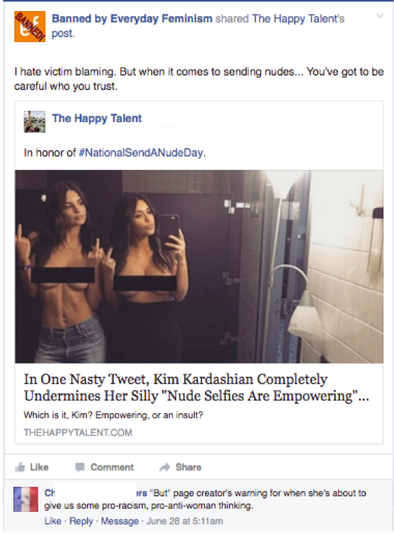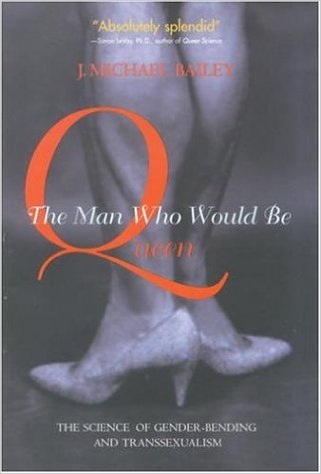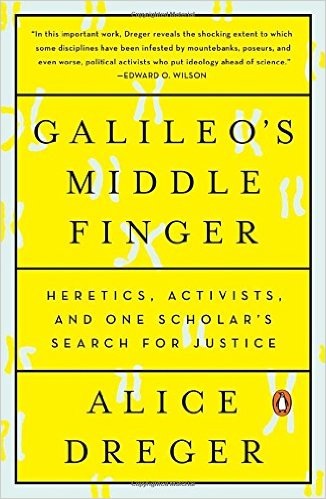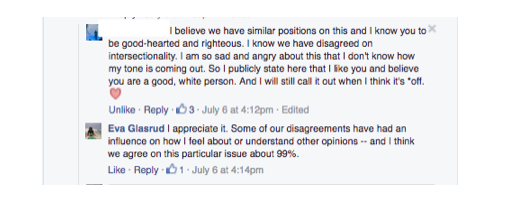|
It's all over the interwebs.
Intellectuals (or even just people with a well-reasoned opinion) expressing that they understand a social justice/Black Lives Matter/extreme feminist argument -- but that they're not quite on-board with it, because of X, Y, Z.
It's called discourse. It's called basic human communication skills -- validating someone's feelings ("I can see why you feel that way," "I'm so sorry you experienced that," etc.), even though you don't 100% agree with them ("but").
But! Any argument that contains the word "but" tends to be followed with more of less of the exact same response: The assertion that "but" is a conjunction used before presenting racist/sexist/ableist/cissexist/homophobic/____-ist ideas. Here's a recent example on an article I wrote: I see this kind of cop-out response all over the internet, and it always makes me worry a little about the future of discourse. The word "but" does not automatically mean the next thing someone says is somehow racist or sexist. In fact, the word "but" is actually very meaningful and important. Here's why: 1. Issues are complicated. Every single issue ever is complicated. If it weren't complicated, it wouldn't be an issue. Issues are complicated because solving a problem for one person or group or people could create problems for others (see also: The War Against Boys: How Misguided Policies Are Harming Our Young Men -- not saying I agree with it 100%, but it makes some compelling arguments). Issues are complicated because we try to come up with solutions before we've actually identified the problem. Issues are complicated because different groups have different definitions of concepts like safety or justice -- many people believe that convicted felons should not have the right to vote, meaning that about 13% of black men can't vote. Many parents are (rightly) fearful of child molesters and sexual predators, and want a sex offender registry to keep such criminals away from schools and playgrounds. What they don't realize is that many "sex offenders" are on the list because they urinated in public; had sex with their 16-year-old girlfriend when they were 18; or got caught having sex with their partner on what they thought was a secluded beach. There is no way around the fact that any policy, good or bad, will irrationally exclude or inconvenience certain people. The only way to make progress or improvements is to hear from affected parties to better understand their perspective -- to learn why they feel how they do. What knowledge, experiences or research they can contribute to our understanding of an issue. To that end, it is important that: 2. We should avoid thinking in absolutes. Intellectuals and sophophiles avoid thinking in absolutes. One would think that this is a value that SJWs share -- after all, it seems very limiting to make a statement like, "All trans people feel this way," or, "All women, regardless of the intersection of their race, ethnicity, religion and political values, must be anti-Israel, because we said so." Because isn't the beautiful thing about being human the diversity of our experiences? When you think in absolutes, you are either displaying your own ignorance -- showing the world that you are incapable of perspective-taking, empathy, or flexible thinking -- or that you care more about dogma than facts, progress and evidence. Even when there is evidence to support your ideas, you should still be open to examining new studies that either support or refute your claim. After all, remember that time a crazy guy published a crazy (and long-since retracted and discredited) study about how vaccines cause autism? What if everyone just blindly believed that guy and stopped vaccinating their kids, even though hundreds of studies have come out since then proving that the guy was wrong -- and statutory tribunals have found him guilty of four counts of dishonesty and twelve counts of abuse of developmentally challenged children? All our kids would be dying of measles and polio and whooping cough, and international travelers would be catching all kinds of hepatitis and typhoid and malaria and rabies. So stay flexible! Stay open to learning new things! And when an issue arises and you don't happen to be a total major expert on it: 3. We should embrace ambivalence. I studied Latin and Greek in high school. That is why I hate the word vagina. It's also why I know the literal meaning of "ambivalent." Ambi- means "both", and valeo- means "be strong, have strength" -- like valences in chemistry. So to be ambivalent on something is to have mixed feelings about it, to have feelings on both sides. Many people use ambivalence and apathy interchangeably. But that's not correct. Apathy comes from the Greek a- (without) and pathos (feeling, suffering). While tribe mentality has become increasingly ubiquitous and polarizing in our society (I'm reading Jonathan Haidt's The Righteous Mind: Why Good People Are Divided by Politics and Religion right now, and it's sooooooo enlightening!), and people (minus Ted Cruz) are feeling increasingly driven to "support their tribe" rather than "vote their conscience"... Being ambivalent, undecided or conflicted is a beautiful thing! It means you're willing to admit that you don't have a strong feeling about something one way or the other. Perhaps because you feel you don't have enough evidence to fall neatly into one camp. Perhaps because you're morally conflicted. Perhaps because you understand that issues are complicated, and both sides are making a good argument. Which is why you might say something like, "I understand your point, but I also think ____." Does that make you a bigot, a -phobic, or an -ist? No. It just makes you someone with your own mind. Which leads me to my next point: 4. It is okay to agree to disagree. It is unreasonable -- and actually kind of gross -- to try to make everyone agree on everything. It's also unreasonable -- and actually kind of gross -- to stop liking someone because they disagree with you. Take the case of Alice Dreger -- a woman who devoted her career to advocating for trans- and intersex rights. Dreger's wildly popular article on sex education, What If We Admitted to Children That Sex is Primarily for Pleasure, was recently redacted from Everyday Feminism... because Dreger is "transphobic." Dreger was utterly confused. How could someone who spent her life studying and supporting intersex children be considered transphobic? Well, it turns out that she's "transphobic" because she wrote a book. A really cool one! It's called Galileo’s Middle Finger: Heretics, Activists, and One Scholar’s Search for Justice. In it, she talks about how activists on both sides of the political spectrum are major obstacles to science. One example she used was that of Ray Blanchard and Michael Bailey. Blanchard is a sex researcher who coined the term "autogynephilia," or sexual arousal that comes from imagining yourself as a woman. Bailey expanded upon this idea in his book, The Man Who Would be Queen: The Science of Gender-Bending and Transsexualism.
Galileo's Middle Finder took an agnostic approach to Bailey's ideas. As a historian, she was interested in the historical truth, not the science. And the historical truth was that the scientists in question faced death threats, blacklisting and other consequences for their ideas -- even though they were supported by evidence.
While not all transwomen are autogynephilic, it seems clear that the concept resonates with at least a small minority. In the words of Alice Dreger, "I've heard from so many transgender women (including old friends) who said Blanchard was spot-on and who said that if you tried to say so as a transgender woman, you’d be subject to the kind of relentless harassment Bailey had been subject to. And then there was the fact that, as I show in my book, at least two of Bailey’s critics had recorded what seemed pretty clearly to be admissions of autogynephilic orientations—that what was at issue was a killing of a messenger, not a wrong or even dangerous message. I do think Bailey has sometimes been unnecessarily obnoxious, as with the cover of his book, and I’ve said so." So... what? There is a right and a wrong way to be a trans woman? If your experience doesn't fit in with the majority, you should be harassed by people in your group? And if you're a scholar who explores both sides of that issue, none of your other ideas on anything else are worth publishing? I'll be honest: I didn't love the Sex is About Pleasure piece. I don't really see why it is helpful for a six-year-old to talk about sexual pleasure. Plus, her essay reeked of self-indulgence -- omg, guys! look what a cool and progressive mom I am! However, I definitely found it thought-provoking. At this point, I am ambivalent on the topic. But! I am vehement in my support of science, and think that Galileo's Middle Finger is a mega-important read -- especially for liberals who think that conservatives are the only anti-scientific crusaders out there. Your people may not be climate change deniers, but you have your faults.
I think it is super weird and regressive to try to force people to agree with you. It is narrow-minded to unfriend people who support policies or candidates that you don't.
If you think that all Trump supporters are racist bigots, for example, you are thinking in absolutes. You are being intentionally ignorant to experiences other than your own. You are letting viral videos about extreme assholes inform your opinion about a huge part of this country. (I wrote a cool thing about Trump supporters a while back -- you should check it out. Skip down to the part that starts with "Liberal progressives are increasingly characterized..." -- and let me know what you think!) Instead of shutting out people who don't always agree with you... why not agree to disagree? Here's a cool message someone sent me recently when we disagreed on a Facebook post that said, "Funny, I'm not seeing #NRA gun nuts rushing to defend #AltonSterling's right to bear arms. I wonder what one thing is different about him."
(Worth noting: my original objection was that Alton Sterling was a convicted felon with no right to bear arms, as well as the fact that it seemed like he had violated the protocol of how to talk to police when you're armed. But. That is an opinion I revised less than 24 hours later, when Philando Castile did all the "right" things and was still shot. Because it's important to examine the data and look for new evidence, right?)
***
"But" is a beautiful word. It means that you can totally understand why some people would feel one way, even though you yourself feel another way. It means you've listened to what someone else thought/experienced/read, but the issue is complicated, and you have a different opinion. It means, I don't agree with everything you think, BUT we can still get along. We can still look for common ground and solutions together. Just look at what happened in Wichita last weekend. The Wichita Police Department and the local Black Lives Matter group planned a cookout, the First Steps Community Cookout. The goal was to begin bridging the gap between law enforcement and the community they serve: They even had a bounce house! What a beautiful illustration of the word "but." "We don't agree on everything. BUT. Let's start looking for a way to fix it." "We still feel pain. BUT. Let's take our first tiny step in the right direction." "We don't have a good solution to this problem yet. BUT. Let's start thinking about each other as real people, instead of opponents and enemies." And here's an ugly example of what happens when you refuse to use the word "but." Rather than see the First Steps BBQ as the beautiful, collaborative event that it was... Patrisse Cullors, a national Black Lives Matter co-founder, griped, "The group of people who had a BBQ with the police are not affiliated with BlackLivesMatter. We don't sit on panels with law enforcement, and we don't have BBQ's or cookouts with law enforcement. We feel the best method at this point in history is by holding police accountable by organizing and advocating for police accountability." That makes me sad. So. Instead of getting all upset next time you see someone use the word "but," remember: "but" doesn't mean, "I'm about to say something -ist." It means, "I took the time to hear/read your thoughts, and I see where you're coming from, BUT here are the flaws I see in your argument."
0 Comments
Leave a Reply. |
About the Author

Eva is a content specialist with a passion for play, travel... and a little bit of girl power. Read more >
Want to support The Happy Talent? CLICK HERE!
Or Find me on Patreon!
What's Popular on The Happy Talent:
Trending in Dating and Relationships:
What's Popular in Science: Playfulness and Leisure Skills:
Popular in Psychology and Social Skills:
Categories
All
|
































 RSS Feed
RSS Feed